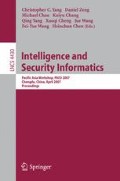Abstract
In recent years, distributed denial of service (DDoS) attacks have brought increasing threats to the Internet since attack traffic caused by DDoS attacks can consume lots of bandwidth or computing resources on the Internet and the availability of DDoS attack tools has become more and more easy. However, due to the similarity between DDoS attack traffic and transient bursts of normal traffic, it is very difficult to detect DDoS attacks accurately and quickly. In this paper, a novel DDoS detection approach based on Hidden Markov Models (HMMs) and cooperative reinforcement learning is proposed, where a distributed cooperation detection scheme using source IP address monitoring is employed. To realize earlier detection of DDoS attacks, the detectors are distributed in the mediate network nodes or near the sources of DDoS attacks and HMMs are used to establish a profile for normal traffic based on the frequencies of new IP addresses. A cooperative reinforcement learning algorithm is proposed to compute optimized strategies of information exchange among the distributed multiple detectors so that the detection accuracies can be improved without much load on information communications among the detectors. Simulation results on distributed detection of DDoS attacks generated by TFN2K tools illustrate the effectiveness of the proposed method.
Supported by the National Natural Science Foundation of China Under Grant 60303012, National Fundamental Research Under Grant 2005CB321801.
Access this chapter
Tax calculation will be finalised at checkout
Purchases are for personal use only
Preview
Unable to display preview. Download preview PDF.
References
Denning, D.: An Intrusion-Detection Model. IEEE Transactions on Software Engineering 13(2), 222–232 (1987)
Lee, W.K., Stolfo, S.J.: A Data Mining Framework for Building Intrusion Detection Model. In: Gong, L., Reiter, M.K. (eds.) Proceedings of the IEEE Symposium on Security and Privacy, Oakland, CA, pp. 120–132. IEEE Computer Society Press, Los Alamitos (1999)
Mirkovic, J., Reiher, P.: A Taxonomy of DDoS Attack and DDoS Defense Mechanisms. ACM SIGCOMM Computer Communications Review 34(2), 39–54 (2004)
Chang, R.K.C.: Defending against flooding-based, distributed denial-of-service attacks: A tutorial. IEEE Communications Magazine 40(10), 42–51 (2002)
Feinstein, L., Schnackenberg, D.: Statistical Approaches to DDoS Attack Detection and Response. In: Proceedings of the DARPA Information Survivability Conference and Expostion(DISCEX’03), pp. 303–314 (2003)
Noh, S., et al.: Using Inductive Learning for the Detection of Distributed Denial of Service Attacks. In: Liu, J., Cheung, Y.-m., Yin, H. (eds.) IDEAL 2003. LNCS, vol. 2690, pp. 286–295. Springer, Heidelberg (2003)
Jin, S., Yeung, D.S.: A Covariance Analysis Model for DDoS Attack Detection. In: Proc. of the Int’l Conf. on Communications, pp. 1882–1886. IEEE Computer Society Press, Los Alamitos (2004)
Li, M.: An Approach to Reliably Identifying Signs of DDoS Flood Attacks Based on LRD Traffic Pattern Recognition. Computer and Security 23(7), 549–558 (2004)
Seo, J., Lee, C., Moon, J.: Defending DDoS Attacks Using Network Traffic Analysis and Probabilistic Packet Drop. In: Jin, H., et al. (eds.) GCC 2004. LNCS, vol. 3252, pp. 390–397. Springer, Heidelberg (2004)
Mirkovic, J., Prier, G., Reiher, P.: Attacking DDoS at the Source. In: Proceedings of International Conference on Network Protocols, Paris, France, pp. 312–321 (2002)
Peng, T., Leckie, C., Kotagiri, R.: Proactively Detecting Distributed Denial of Service Attacks Using Source IP Ad-dress Monitoring. In: Mitrou, N.M., et al. (eds.) NETWORKING 2004. LNCS, vol. 3042, pp. 771–782. Springer, Heidelberg (2004)
Rabiner, L.R.: A Tutorial on Hidden Markov Models and Selected Applications in Speech Recognition. Proceedings of the IEEE 77(2), 257–286 (1986)
Paxson, V.: An Analysis of Using Reflectors for Distributed Denial-of-Service Attacks. Computer Communication Review 31(3), 76–89 (2001)
Peng, T., Leckie, C., Kotagiri, R.: Detecting Distributed Denial of Service Attacks by Sharing Distributed Beliefs. In: Safavi-Naini, R., Seberry, J. (eds.) ACISP 2003. LNCS, vol. 2727, pp. 214–225. Springer, Heidelberg (2003)
Jung, J., Krishnamurthy, B., Rabinovich, M.: Flash Crowds and Denial of Service Attacks: Characterization and Implications for CDNs and Web Sites. In: Proceeding of 11th Word Wide Web conference, Honolulu, Hawaii, USA (2002)
Sutton, R., Barto, A.G.: Reinforcement Learning: An Introduction. MIT Press, Cambridge (1998)
Hu, J., Wellman, M.P.: Multiagent Reinforcement Learning: Theoretical Framework and an Algorithm. In: 15th Intl Conference on Machine Learning, pp. 242–250 (1998)
Xu, X.: A Reinforcement Learning Approach for Host-Based Intrusion Detection Using Sequences of System Calls. In: Huang, D.-S., Zhang, X.-P., Huang, G.-B. (eds.) ICIC 2005. LNCS, vol. 3644, pp. 995–1003. Springer, Heidelberg (2005)
Author information
Authors and Affiliations
Editor information
Rights and permissions
Copyright information
© 2007 Springer Berlin Heidelberg
About this paper
Cite this paper
Xu, X., Sun, Y., Huang, Z. (2007). Defending DDoS Attacks Using Hidden Markov Models and Cooperative Reinforcement Learning. In: Yang, C.C., et al. Intelligence and Security Informatics. PAISI 2007. Lecture Notes in Computer Science, vol 4430. Springer, Berlin, Heidelberg. https://doi.org/10.1007/978-3-540-71549-8_17
Download citation
DOI: https://doi.org/10.1007/978-3-540-71549-8_17
Publisher Name: Springer, Berlin, Heidelberg
Print ISBN: 978-3-540-71548-1
Online ISBN: 978-3-540-71549-8
eBook Packages: Computer ScienceComputer Science (R0)

